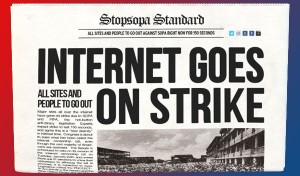 This week, nearly three dozen high-profile websites participated in an online protest of two bills before Congress. Wikipedia, Reddit, Craigslist and BoingBoing were among sites that went dark completely or temporarily redirected visitors to a blackout splash page to send a message to lawmakers to vote against the Stop Online Privacy Act (SOPA) and the Protect IP Act (PIPA). Google remained up and running, but it covered its logo with a black bar.
This week, nearly three dozen high-profile websites participated in an online protest of two bills before Congress. Wikipedia, Reddit, Craigslist and BoingBoing were among sites that went dark completely or temporarily redirected visitors to a blackout splash page to send a message to lawmakers to vote against the Stop Online Privacy Act (SOPA) and the Protect IP Act (PIPA). Google remained up and running, but it covered its logo with a black bar.
The purpose of the bills were to target and shut down so-called “rogue sites” that are set up outside the United States in countries where copyright laws are more lax. These sites then distribute pirated copies of copyrighted intellectual property including music, movies and television shows. These pirated copies have cost media companies billions of dollars in lost revenue.
While copyright holders can’t specifically fight websites in another country because the sites don’t fall within the jurisdiction of U.S. courts, these laws would force U.S. companies to stop funding, advertising and linking to them. In essence, they cut off access and financial support to the sites.
On some level, that’s the way it should be: if you created the next great pop song or directed the next blockbuster motion picture, you’d want your intellectual property — and your profits — protected, too.
The issue for opponents to these bills isn’t so much protecting intellectual property or copyright holder income, but rather the issue of censorship.
That’s because these laws go a bit further. One key component is DNS Blocking, which opponents are quick to point out is the same method China’s government uses to block sites it doesn’t want its citizens to see. Some fear that any “broad” language in the bill could open the door to abuse of power by the Justice Department, resulting in legitimate sites the government just happens not to like to be blocked.
Then there’s the problem of increased responsibility: websites like YouTube and Vimeo and social networking sites like Facebook and Google+ could be held accountable for copyrighted material that its users post. This, opponents say, will force them to self-censor to avoid legal problems, and this could restrict content dramatically.
Some critics even argue that a riskier legal climate could affect the number of new startups that launch, costing the country tech jobs.
And that riskier legal climate could reach all the way to the user, who could face a felony charge for uploading a copyrighted song: a popular tweet this week claims, “Under SOPA, you could get 5 years for uploading a Michael Jackson song, one year more than the doctor who killed him.”
It’s unfortunate that we’ve reached a level of cynicism in this country that we become certain that the worst-case scenario will automatically be the norm from day one. But we have, and so armageddon-style marketing messages about what could — stress that “could” — happen are enough to scare the daylights out of many a web surfer.
Did the blackouts work? The New York Times reports that “at least 10 senators and nearly twice that many House members announced their opposition” to the bills.
Congress is slated to vote on the bills on January 24th, so we’ll have to wait and see whether our lawmakers take the concern to heart. In the meantime, we can only wonder how much authority the government really needs and how much of a slippery slope we’re willing to risk to protect copyright.
